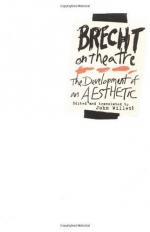
|
| Name: _________________________ | Period: ___________________ |
This quiz consists of 5 multiple choice and 5 short answer questions through 1918-1932 (Augsburg, Munich, Berlin), Section 2.
Multiple Choice Questions
1. _____ is two volumes of collected plays published by Malik Verlag, London.
(a) Theaterarbeit.
(b) Gesammelte Werke.
(c) Schriffen zum Theater.
(d) Sonatas.
2. Brecht states that opera cannot be wished away and its _____ have an important social function.
(a) Illusions.
(b) Truths.
(c) Morals.
(d) Emotions.
3. Brecht's _____ on theater are not included in this book.
(a) Notes.
(b) Programming.
(c) Poems.
(d) Students' essays.
4. What is the main task of epic theatre?
(a) To emote.
(b) To mask.
(c) To report.
(d) To exaggerate.
5. Who were Brecht's Frankfurt publishers?
(a) Breitkopf Hartel.
(b) Schoenhofs.
(c) Hartel-Verlag.
(d) Suhrkamp-Verlag.
Short Answer Questions
1. What does Brecht say was a characteristic of actors in theatre of his time?
2. What does Brecht call people who came to the theatre to get their cockles warmed in "Conversations with Bert Brecht"?
3. Like Tolstoy and Strindberg, Brecht says that Wedekind was one of the greatest _____ of modern Europe.
4. In "Shouldn't We Abolish Aesthetics?", Brecht hopes that _____ would be the death of their existing drama.
5. How did Brecht characterize Shaw's work in "A Catching Infection: Fun"?
|
This section contains 196 words (approx. 1 page at 300 words per page) |

|




